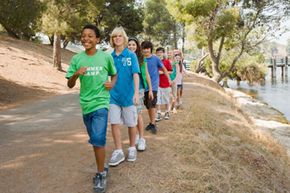
According to the Epilepsy Foundation, epilepsy affects more than 300,000 children in the United States alone. There are different types of epilepsy, and they affect people in different ways. A seizure disorder may not be a big deal to a kid — he or she takes some medicine and goes about the business of daily life, possibly even outgrowing the seizures. For others, epilepsy could be a serious obstacle to living a "normal" life, leaving a child lonely and feeling set apart from other kids his or her age. Here are some ways to keep a kid involved:
- Team up: Kids with epilepsy shouldn’t be isolated from physical activity. It’s easy to get overprotective with the desire to keep a child from getting hurt, but that can lead to a lack of important socialization as well as low self-esteem. Some studies have shown that epileptic kids don’t exercise as much and have a higher body mass index (BMI) than other kids, an important thing to consider in the age of the obesity epidemic. Most sports are fine for kids with epilepsy, although you might need to exert special caution with an activity like cycling or horseback riding. Physical limitations depend on the type of epilepsy the child has and the frequency of seizures — a kid who has auras before a seizure can learn to recognize its onset and take a break. Don’t shy away from team sports, either — learning teamwork and cooperation is good for any kid.
- Take it outside: Kids with epilepsy face special challenges, like obstacles to getting a driver’s license. They also have to deal with the fact that a lot of people harbor misconceptions about seizure disorders, and many people are uncomfortable with conditions they don’t fully understand. If you’re trained in first aid and seizure recognition, a kids’ camping trip is a fun, "normal" activity that encourages bonding and socializing. If you’re thinking about suggesting an overnight summer camp for a kid with epilepsy, take a look at both camps geared toward kids with epilepsy and camps that aren’t. If you think it’s important for the child to meet and bond with other children with epilepsy, by all means choose the former, but you certainly don’t have to. A "regular" camp for music, outdoors activities or science will be just as rewarding if there are appropriately trained staff available